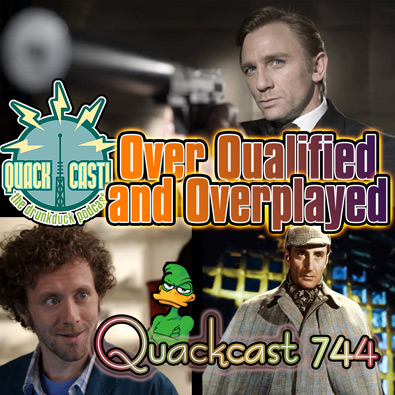 LISTEN on our player!
LISTEN on our player!
Or Amazon Music - https://music.amazon.com.au/podcasts/24f85853-5d63-44ac-885f-da23db0a53ad/the-quackcast
Professions in fiction are usually always portrayed in very exaggerated, super fantastical expert versions of themselves. Like if it's a psychologist they generally know exactly what a person is thinking, why they're thinking a certain way, what all their issues are, why they have them and how to fix them. They can tell if a person is lying and the truth they are coving up by doing so! If it's a police detective and they're a main character they can generally solve any crime pretty easily with their amazing abilities… if they're NOT a main character then they're usually pretty useless though haha!
Why is this done? Well there are a few reasons, one is that the creators might not know very much about the profession so they pack in all the best parts of it into their portrayals, especially if they want to show that their character is the best at something. One reason is that it's a good shorthand and saves time and resources if you just pack one character with the skills of 10 people instead of having to write an entire team, so they become almost an avatar that represents the idea of a profession. I think of the character Doctor Hodgins in the TV series Bones, he specialises in slime, bugs, and soil samples at a forensic pathology lab - real experts in that field say that it would require a large team of people to match the work of that character.
We commonly see this with action heroes. Spies for example, specifically field agents have so many skills and abilities that they do the work of an army of people. John Wick represents the fictional occupation of a hit-man with fictional skills of solider martial artists. Doctors in fiction (as main characters), can recognise any malady without advanced testing or machinery and usually cure them in a single day. Artists can reproduce any style of work extremely quickly and draw super realistically from memory. Musicians can play any song with no practise and grab an audience's attention and emotion with it in their first performance.
Sherlock Holmes is ostensibly a prime example of this trend, he's an expert detective and can solve any crime with almost superhuman powers of observation and leaps of logic. In most versions of him that is how he's always portrayed, but that's actually not quite right since the version of Holmes we're given is mediated through the perspective of his partner Doctor Watson who is astonished by Holmes and hero worships him, so he could almost be considered an “unreliable narrator”. In THIS way Sherlock Holmes could be an example of the CORRECT way to handle this trend: He SEEMS to be a super expert mainly because the view of him we see is recounted by a person who thinks of him that way.
What are some issues with this? If it's done too much it can easily get on the nose a ruin suspension of disbelief. It can also create unrealistic expectations in audiences and this can cause REAL harm in reality when people expect all their ills to be easily diagnosed and cured- and when they aren't then they turn to alternative medicine (fake medicine) which promises cures and yet does nothing but pretends it does. People will shun real police who can't seem to solve disappearances fast enough and turn to psychics or even violent vigilantes instead. So there are indeed bad consequences for taking things too far in fiction.
Has your job ever been misrepresented this way? What are some of the worst, silliest versions of this trend? What are examples of when it's done right?
This week Gunwallace has given us a musical theme inspired by Machine World - Desolate plains, the image of post apocalyptic destruction, black rocky sands, rusting steel wreckage, the massive skeletal remains of long dead machinery, haunted, ancient, abandoned, yet humanity persists.
Topics and shownotes
Links
Featured comic:
Drunk Duck Awards 2025 - https://www.theduckwebcomics.com/news/2025/jun/10/featured-comic-drunk-duck-awards-2025/
Featured music:
Machine World - https://www.theduckwebcomics.com/Machine_World/ - by Hamburger_mafia, rated M.
Special thanks to:
Gunwallace - https://www.theduckwebcomics.com/user/Gunwallace/
Tantz Aerine - https://www.theduckwebcomics.com/user/Tantz_Aerine/
Ozoneocean - https://www.theduckwebcomics.com/user/ozoneocean
Kawaiidaigakusei - https://www.theduckwebcomics.com/user/kawaiidaigakusei
Banes - https://www.theduckwebcomics.com/user/Banes/
VIDEO exclusive!
Become a subscriber on the $5 level and up to see our weekly Patreon video and get our advertising perks!
- https://www.patreon.com/DrunkDuck
Even at $1 you get your name with a link on the front page and a mention in the weekend newsposts!
Join us on Discord - https://discordapp.com/invite/7NpJ8GS

Quackcast 744 - Over Qualified and Overplayed
Ozoneocean at 12:00AM, June 17, 2025
Banes,
Drunk duck,
Drunk Duck Awards 2025,
Featured comic,
Gunwallace,
Kawaiidaigakusei,
Machine World,
musical feature,
Over Qualified and Overplayed,
Ozoneocean,
Quackcast 744,
Tantz,
Webcomics hosting
4 likes!


©2011 WOWIO, Inc. All Rights Reserved Mastodon





marcorossi at 1:40AM, June 17, 2025
I think what happens is that, for reasons of wish fullfillment and emotional satisfaction, the author wants the lead to be supercool, defeat a lot of enemies, solve a lot of misteries etc., and the "skill" part is just a thin disguise of this wish fulfillment. So for example in action movie, even in the realistic sounding ones the protagonist has a lovel of skill that would make him world champion, because the martial art is just an excuse to explain how Bond/Batman can defeat 27 minions in under a minute, but the author really wants to have the hero defeat 27 minions in undr a minute. In fact at times the thing is even exaggerated to reinforce this superhuman feeling, e.g. in the original stories Holmes deductions are extreme to the limit of the farcical, and often in martial arts movies the hero will use unrealistically athletic and showy moves (instead of, say, straight punches) just to show the extreme level of skill.